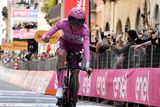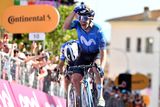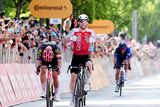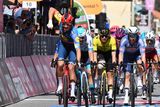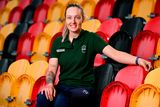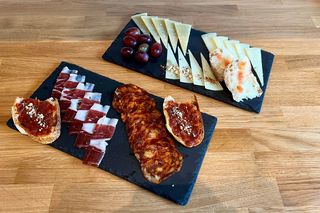Nicolas Roche on his Irishness and the burden of being his father's son
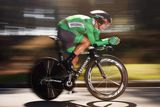
Six years ago, on the morning of the opening stage of the Tour de France, I stepped onto a busy train at Beaulieu-sur-Mer and was hooked by the face of a beautiful woman in the crowd.
Is that? . . . No, couldn't be . . . Yes it is . . .
Lydia!
Was she with friends? I wasn't sure. Should I say hello? Maybe not. There was bad blood between her former husband, Stephen Roche and myself. She would know that.
A few minutes later we arrived in Monaco and took different exits from the station. The streets were crowded with excited bike fans and I had just found my bearings and cut back towards the port when I spotted her again, alone and seemingly lost.
We exchanged greetings and chatted for a moment. She had travelled from her home in Antibes to see Nicolas before the prologue.
"Do you know where you're going?" I asked.
"No," she replied.
"Do you have a pass?"
"I never had a pass for anything," she smiled.
We set off towards the port and the Quai Antoine where the team buses were parked. It was a big day for Nicolas, his first Tour de France, and Lydia was excited but mostly nervous. I left her at the steps of the AG2R bus and wished her well. It was the first time I'd seen her in almost 12 years. I'd never spoken to her son.
Two years later, in September 2011, we met for the first time at the Irish Book Awards. A week later I travelled to Italy and his home in Varese to interview him.
Nicolas Roche was easy to love. He had his mother's class and his father's charm and if he played any other sport we'd have got on like a house on fire.
But cycling was not any other sport. The genie was out of the bottle, its secret had been exposed and left some ugly and painful truths. I reminded him of Judge Franca Olivia's report into blood doping at the Carrera team in 1993: "One cannot but arrive at the conclusion that Dr Grazzi was effectively involved in the direct dispensing EPO to (Guido) Bontempi, (Claudio) Chiappucci, (Mario) Chiesa, (Stephen) Roche and (Ralf) Sorensen."
Our pleasant evening was spoiled.
We've gotten along pretty well since. He has been a fine ambassador for Ireland and continues to write a very engaging diary on his life as a professional in the Irish Independent. Unfortunately, like most of his fellow pros, he rarely has much to say when the spotlight turns to doping.
Two weeks ago, like most of his fellow pros, he did a lot of whining when the UCI, cycling's world governing body, published the findings of the long awaited Cycling Independent Reform Commission. It was obvious from his column (he was riding Paris-Nice) that he hadn't read the report and I sent him a barbed tweet:
"Hey @nicholasroche try 'I haven't read the report yet, and won't make a fool of myself by commenting until I do."
A few hours later, he sent me an angry message: "I try to speak out and you still knock me down. Hope the book you were doing on rugby is going well. Regards."
He was pissed. I was pleased. Angry was good. We arranged to meet in Monaco, on the day after the conclusion of Paris-Nice.
* * * * *
1 A sense of identity
I can see my mother standing just a few yards away. I stretch out my arms, but I can't get through the throng of television cameras, photographers and microphones to reach her. She starts to cry, tears of pride. As the TV crews push their cameras closer to my face and the journalists stick an endless row of microphones under my nose, I too begin to well up. But I'm not crying out of pride, I'm crying out of fear.
'Stephen! Stephen! Stephen! . . . ' the journalists call out.
I turn to the man beside me. He is dressed in yellow and is carrying me, but his name's not Stephen . . . It's Daddy. My name is Nicolas Roche. I'm three years old and my daddy has just won the Tour de France.
Nicolas Roche
Inside the Peloton
Paul Kimmage: I was watching you in Paris-Nice last week and you race with a small Irish tricolour on the sleeve of your jersey. Can we start please with your identity and that sense of Irishness?
Nicolas Roche: Well, I'm 100 per cent Irish since the last time we met when I still had dual citizenship, but I felt I needed to make a cut and went through the official legal procedure of giving my French citizenship back in 2012. I was born in France and spent a lot of time living in Paris and I have nothing against my French side but I wanted to make things really clear.
PK: It seems an odd thing to do. Why was that important to you?
NR: Because I always felt I was in the middle; when I was in Ireland I was 'the foreigner', and when I was in France I was 'the foreigner', and I'm attached to both sides, but there's a little thing that makes me feel that bit more Irish and I felt I had to cut.
PK: You didn't have to cut?
NR: No, I wanted to cut.
PK: What did your mother say?
NR: She was quite upset but it's all good now. We've had a proper talk and I've said, "Listen, its nothing against you. I just feel that little bit more Irish than French and need to cut." But I think she took it personal.
PK: It probably felt like, 'I am divorced from his father and now he's choosing sides'.
NR: Well, at the time my mother didn't see it that way but my granddad did.
PK: Her father?
NR: Yeah, he was more upset: 'Oh he's choosing his father more than his mother.' Unfortunately he died a couple of months after that from cancer but he was quite alert still when it was going through and I talked to him about it. For him, it was more of a symbolic change towards my mum rather than me preferring to represent Ireland.
PK: Your Mum lives down here?
NR: She's in Antibes with my two brothers.
PK: The last time I met your mother was at the train station when the Tour started here in 2009. She's still a fantastically good looking woman.
NR: Yeah, it's funny, we went for dinner last year, just the two of us. One of my friends has a pizzeria in Antibes; I hadn't seen him for a few years and at the end he says, 'Hey Nico your girlfriend is nice but she's a bit older than you.' I said, 'That's my mum!' (laughs)
PK: I hope you told your mother.
NR: I did, yeah. She was pleased.
PK: You're 30 years old now?
NR: Yeah.
PK: How would you break that down in terms of the time you've spent in Ireland and France?
NR: The first four or five years we were back and forth, not quite six-months-Ireland, six-months-France, but close enough.
PK: You'd come back to Dublin with your father during off-season?
NR: Exactly. From the age of six to 11 I was in France, outside Paris. My parents separated and got back together, and decided to start over again in Ireland, so we packed up and moved to Ireland and stayed there until I was 15. Alexis was actually born in Ireland, and the year we came back Florian was born here, in Nice.
PK: So you spent from '96 to '99 in Dublin?
NR: Yeah.
PK: You went to school in Blackrock?
NR: Yeah, for one year in '98. I was 15.
PK: What was that like?
NR: It was a fantastic experience. I was in the French school (Lycee Francais d'Irlande) in Foxrock for the first two years and the classes were small. There were eight or nine of us I think, or sometimes 12, because people would come for six months, and then I went to Blackrock and it was absolutely huge. I loved it but I wasn't the best student. It was a big change for me to go from having all my classes in French to doing everything in English and I struggled, especially with maths. Two plus two was still four, but the approach was completely different. And they told me I had to play rugby.
PK: You had played soccer before that?
NR: Yeah, for Park Celtic. I enjoyed that.
PK: What position?
NR: Centre forward. I wasn't Ronaldo but I was a quick runner and scored a few goals. Then I went on to rugby and scored two tries in my first game and just fell in love with it. My parents used to make fun of me: "The only reason you like rugby is that you like to stay clean." I tried to avoid the tackles and was always the cleanest on the team at the end of every match. I really enjoyed it and have often thought it was the one other sport I could have given a go.
PK: You played two team sports and did well but chose an individual sport.
NR: Yeah, there was always a frustration in relying on other things. You could be having a great day but still lose the game, or have a bad game and the team would suffer and I didn't like that.
PK: You wanted to control your own destiny?
NR: Yeah.
PK: How big an influence was your dad in all this? You were three years old when he won the Tour but you wouldn't remember too much about that.
NR: No.
PK: When was the first time you realised he was famous?
NR: I'd say in the later years . . . I remember watching him in San Sebastian and some of the post-Tour (races) in the early 90s. I was on holiday in my French grandad's place in Ile d'Oleron when he won at La Bourboule (16th stage of the 1992 Tour de France) and remember watching the finish and realising there was something going on.
PK: Was that a factor in your decision to take up the sport?
NR: I liked it. Every time I watched a race I'd get dressed up and put on shorts and jerseys that were lying around and race around the house with imaginary opponents. Or create scenarios with my sister; we'd pretend we had a crash and roll over in the grass and play 'Tour de France' in the back garden.
PK: So you always had that love or desire for it?
NR: Yeah.
PK: What about the burden of being Stephen Roche's son?
NR: I'd say the time I suffered most was in my first year as a pro. When I was younger, people assumed I'd have the best bike and better legs because I was the son of Stephen Roche but that didn't really bother me. What bothered me was the professional world. There was a lot of pressure at Cofidis (his first pro team) because I think initially they thought I was going to be the next superstar. A lot of the staff had worked with my dad and I felt I could only disappoint them.
PK: And how is it now? You finished Paris-Nice yesterday, where it all started for him.
NR: Yeah, I mean there's always a link to what he did. People tweet photographs of him to me but I just get on with it. I do my riding and I'm competitive and get results; some months I'm on form and some months I'm not on form but I always give my maximum for the team. And if I'm not going to win the Tour well, it doesn't matter. There's only a couple of riders who can win the Tour.
PK: So you're your own man, basically?
NR: Yeah.
PK: Nicolas Roche?
NR: Yeah.
PK: We touched on nationality . . . where do you see yourself living when your career finishes?
NR: I don't know. It's my big question. I have no idea whatsoever. I'm getting married in October and my wife is from Madrid so there's a high probability she will want to live in Spain and I'd be open to that for a few years. Or if there was a job opportunity I wouldn't mind coming back to Ireland, but I don't think I'll be staying in France or Monaco.
PK: The last time we spoke you told me your dream was to open a restaurant - 'L'Olivo' - in Tuscany. That's gone, is it?
NR: (Laughs) My girlfriend is allergic to olives. Last year, we spent two nights with one of my friends in Arrezo. He has a massive olive tree in the back garden and she had a severe allergy. I said: "Can I admit something? One of my dreams was to have a beautiful house in Tuscany on top of a hill overlooking some vineyards and with a (driveway) lined with cypress trees and a massive olive tree." She said "Well, you've got two choices, change your dream or you change your girlfriend."
PK: You were living with an Italian girl, Chiara, in Varese?
NR: Yeah, that finished two years ago.
PK: And your fiancée?
NR: Deborah. We met before the Vuelta (Tour of Spain) in 2013. She was working for one of the sponsors.
PK: You were 27 the last time I interviewed you. You said: "The next three years are so important to me. I feel I am getting there but there is something missing that I have to find." What was missing and have you found it?
NR: Well, not really because I stayed very similar. I thought I could lose more weight; that I could train better and had a margin for progression. I was hoping I could break into the top five in the Tour or make the podium in the Vuelta but I didn't make it.
PK: You were 12th a year later in the Tour?
NR: Yeah, I think physically I was capable of much better but I was obsessed with not putting on weight and it caught up with me on the (11th) stage to La Toussuire; I had a complete hunger flat, 6k to the finish and dropped from ninth to 13th. So that was the year I was physically the strongest in the Tour but I was weighing myself five times a day and under-ate. I knew (that stage) was going to be 'D-Day' on the Tour and thought, 'Tomorrow my body weight has to be the lowest ever.' And instead of 'carbo' loading I did the opposite and starved myself.
PK: How hard was that?
NR: It was hard. I'm pretty sure that if I had an extra bowl of pasta that night I would have been eight or ninth in the Tour.
PK: Sure, but what I mean is, how hard is it to deprive yourself of food like that? Because the general public have no idea about that side of the game and what it takes to perform at that level?
NR: I think it's the hardest (part of it); it's harder than training. The wife of a friend of mine is a model for IMG and she posted a photo on Instagram the other day of a plate with a fork and a smiley face. It (the caption) said, 'The easy bit is the hour I spent working out. The hard bit is to keep my plate as empty as possible for the next 23.' I said, "That's like being a cyclist.' And it's true. Doing five-hour training rides is something we work towards since the age of 12, but the most difficult part is the food, the quality and obviously the quantity.
PK: There wasn't as much emphasis on weight when you first turned pro. When did that change, this need to be almost skeletal?
NR: I'd say 2009, 2010. I really started to pay attention in 2008. I had an ulcer that year and went down from 72 to 68/69 and just felt healthier than ever at 69 kilos. I did my first good performance in the Vuelta (13th) and thought, 'What if I was able to hold that weight all year long?' But somehow my body just doesn't allow me to do that.
PK: You look pretty thin now.
NR: I'm okay.
PK: What do you weigh?
NR: I'm 71.
PK: What have you eaten today?
NR: This morning I had toast with a bit of butter with some ginger marmalade.
PK: One slice of toast?
NR: Yeah, and a cappuccino.
PK: That's it?
NR: Yeah.
PK: And that was before you went for a ride?
NR: Yeah, I did two hours.
PK: You didn't eat during the spin?
NR: Actually, I did. I stopped for a coffee and it came with a little biscotti.
PK: And nothing since?
NR: No, but I'm not hungry. I had a good meal last night.
PK: What's a good meal?
NR: It was a dinner with Richie (Porte) and Geraint Thomas and some of the lads who live around here. We had tuna tartar and a bit of salad.
PK: Any alcohol?
NR: We had a bottle of red wine. Alcohol, unfortunately, is the worst fat. You can't burn it. It's worse than chocolate theoretically.
PK: Trying to annoy me now, are you?
NR: (Smiles) No, I love a glass of wine, it's one of my treats. I wouldn't drink every day of course but I'd have three or four glasses a week.
PK: How many pros live here?
NR: About 40.
PK: Tax reasons?
NR: I think essentially for tax reasons but it's great for training. The advantage of Monaco is that you go out the door and you're climbing. It's 12/13 degrees in winter and you can do 15k climbs. Plus it's close to Nice airport.
PK: And your team, Sky, have a base here?
NR: Yeah, they have an office on the moyenne corniche.
PK: This is your 11th season as a professional?
NR: Yeah.
PK: And you still love it?
NR: Even more.
PK: How do you explain that?
NR: Well, it's not that I love it more I just . . . love being on the bike. I could have just done an hour this morning but I love that feeling of being out early in the fresh air. Racing is the motivation to go out but I enjoy the fun part and the travelling and all that. A lot of riders have said your perspectives change when you start having kids, but I haven't arrived at that point yet.
2 Dangerous Liaisons
Bjarne leaned back in his chair. Took a sip of wine.
"Have you ever tried a transfusion, Tyler?"
I shook my head. Bjarne's blue eyes lit up.
"Oh, you need to do it. You will like it."
Okay, I said. Sounds good.
Tyler Hamilton,
The Secret Race
PK: You changed team in 2013.
NR: Yeah.
PK: What were the reasons?
NR: I wanted to go into a big international structure. I had spent eight years with French teams and had loads of friends who had made the move and said how much they had learnt. Nick Gates (a former rider and manager at the Saxo Bank team) used to live in Monaco and I was out with him on a coffee spin with some of the F1 drivers and he said, "Did you ever consider coming to us? I think you would fit in." And that's how it started.
PK: You know what the next question is.
NR: Well, it's going to be about Bjarne (Riis) or Alberto (Contador), one or the other. Or both. (Smiles).
PK: Right.
NR: Well, at that time Bjarne wasn't (involved) in that Danish thing.
PK: The investigation?
NR: Yeah.
PK: But you knew he had doped because he had admitted it. And you knew he had helped (Ivan) Basso and (Tyler) Hamilton to dope. And it was incomprehensible to me that you would align yourself with someone with that reputation.
NR: I saw it another way. In my mind Bjarne was the (master) tactician and technician. He was great about diet and training and when I spoke to him on the phone it was all about how he was going to make me a better rider. We were going to spend the winter working on my time trial position; we were going to go to the track in Brescia and the wind tunnel in Milan. And I agree with you, there was that shadow of Hamilton and Basso but he had also helped to create (an anti-doping programme with a Danish physician, Rasmus Damsgaard) and there was a dietician on the team and a kitchen truck and all of these things. I thought, 'Alright he doped, but my choice is not to dope and he's not going to change my point of view.'
PK: So the plusses outweighed the negatives?
NR: Yeah.
PK: What about the question of your responsibility to the sport and the risk to your reputation? People always ask: 'What about Nicolas?' And I was always prepared to give you the benefit of the doubt until you joined that team.
NR: I understand that, but look at all of the teams - there's not many that have not had a problem.
PK: You signed for more money?
NR: The same.
PK: Did you get more going to Sky?
NR: Roughly the same, twenty grand I think.
PK: So the money was not a factor?
NR: No.
PK: You say you went to Riis to better yourself but you spent two years riding for Contador in the Tour, and you've spent the last week riding for Richie Porte and Geraint Thomas. What's happened to your ambition?
NR: My ambition is still there but I've realised that I don't have the physical capability to be the leader the whole year. It doesn't matter what I do in the winter, March and April are not my months so it's better to help someone else and be ready in the second part of the year to do my own thing. The big one obviously is the Tour. I've had three proper goes at it and finished 12th, 14th and 22nd, so why not play a part and try and win it with someone? I loved the Tour, it was different working for Contador but it was also quite exciting because we were there to win.
I had a few opportunities last year (to win a stage) but it's not easy; it's not a PlayStation game where you say, 'Alright, I feel good, I'm going to go for it today.'
PK: Okay let's talk about the CIRC report. You haven't read it?
NR: No.
PK: Are you going to read it?
NR: I don't know. I should. I've read parts of it.
PK: You say you should. Why don't you? Why won't you?
NR: I didn't say I won't, I'll probably read some of the chapters but it's a long book.
PK: But I know you read books?
NR: I read books, yeah. At the moment I'm in the middle of reading all this pre-wedding preparation stuff with the local priest (laughs) . . . No, I don't think I'll read all of it but I'll read some of it, and pay attention to it, because if I want to criticise or move forward on it, I have to know what's in it.
PK: This is what you said about it last week in your Irish Independent diary: "To be honest I was expecting more names to be named and more sanctions to he handed out, something that would be of use in the fight against doping, rather than the useless rehashing of stories we've all heard before."
NR: Yeah.
PK: But there are names: Pat McQuaid and Hein Verbruggen, two former UCI presidents, are criticised by the report. Is that not important?
NR: It is important obviously, but that's the old governing body and things we've already discussed.
PK: But we haven't really discussed it. I asked you about Lance Armstrong in October 2011 and whether you believed he had ever doped and you said it was "a complicated case".
NR: Yeah, because at the time there was only the accusations and nothing was official.
PK: A year later, after he had been busted by USADA, you were interviewed on Primetime. You said, "Hopefully people will understand that this situation and this story - that is on the way to being closed now - is something that happened 10 years ago."
NR: I remember that.
PK: And the presenter, Claire Byrne, reminded you that your team-mate, Alberto Contador, had just been stripped of the Tour de France. She then asked if you thought Verbruggen and McQuaid should leave the UCI. Do you remember what you said?
NR: No.
PK: "I don't know all of the details." And now all the details are in the CIRC report but you haven't read them yet?
NR: I've read some of them . . . the stuff about the Tour of Ireland and the authorisation for Armstrong to ride early.
PK: Did you read what Travis Tygart (the USADA CEO) said about McQuaid?
NR: No.
PK: "During USADA's case against Armstrong in 2012, and under the direction of former UCI president Pat McQuaid, the UCI intentionally adopted an inaccurate position on its own anti-doping rules in order to derail USADA's case against Armstrong and his co-conspirators."
NR: (Smiles) That's quite detailed.
PK: And quite damning?
NR: Yeah.
PK: As a rider, how important is it for you that the rules are applied? And applied to everyone in the same way?
NR: It is important, obviously.
PK: And is that not fundamentally important to the sport going forward?
NR: I think, in a way, that's why he wasn't elected. I think that was the consequence of what he had done.
PK: His son, Andrew, is your agent. Did that influence what you said about him on Primetime?
NR: No, it was an honest lack of knowledge. There's two things: I have a good relationship with Andrew, he is one of my best friends and whatever his dad did, or didn't do, has nothing to do with him.
PK: Sure
3 What is clean?
There is a considerable amount of spin around what being clean means to riders and teams. It can be used today in the same way that the phrase, "I have never tested positive" was sometimes used in the past to suggest that a doping rider had never doped. For the public, the presumption that a rider is clean has been eroded by the scandals over the years.
1.2.1 Cycling Independent
Reform Commission
PK: Are you clean?
NR: Yes.
PK: What does that mean?
NR: It means that I'm a rider who has never taken anything that is illegitimate or can be sanctioned in the sport.
PK: You have not used products that are on the WADA list?
NR: Never.
PK: And that's your definition of clean?
NR: Yeah.
PK: Because that's one of the more interesting aspects of the report: there are some guys who believe that clean is taking products on the list that aren't detectable. Or that it's okay to experiment with products on the list. Or okay if you stop taking them before an event.
NR: That's quite disturbing.
PK: Yes, it is. Another thing they noted was that "hardly any riders in the peloton today are willing to allow their samples to be used anonymously for research purposes into developing new methods of drug detection.
A box on doping control forms today can be ticked to enable such testing. The Commission was told that over 95 per cent of the time, it is not ticked."
NR: I tick it.
PK: Are you surprised so many don't?
NR: I'm surprised it's so high but I've thought about it . . . Okay, so you agree to give your blood (sample) but you've no idea where it's going or how long it will be sitting in a lab. And what if you are using something like L-Carnitine and they decide in 10 years' time to put it on a (prohibited) list?
PK: What's L-Carnitine?
NR: It's a food supplement that supposedly helps your body to burn fat before carbs. It's nothing crazy. A lot of the women that do fitness buy it.
PK: Do you take it?
NR: I've taken it sometimes . . . in the winter.
PK: So there's pressure. The sport demands you lose weight and that opens the field of supplements?
NR: Yeah, but I could have said something like BCA which is amino acids?
PK: No, no, I'm not zoning in on the product. My point is that having one slice of toast with ginger marmalade for breakfast is not enough. You have to look elsewhere?
NR: Yeah, I've taken it sometimes during the winter; I don't like taking it when it's warm.
PK: Weight loss is another area highlighted in the report: Another area in which riders seek to improve their performance is through reducing their weight in order to increase their power/weight ratio. Interviewees noted cases of dramatic weight loss in certain riders, which they felt could only be explained by use of performance enhancing products. The Commission heard that the desire to lose weight might also be leading to an increase in eating disorders amongst riders.
NR: I agree with the eating disorders; I have friends who say that all I talk about is weight and food. We go to a restaurant and I'll look at the menu and I'll treat myself obviously, but in a careful way. So it's become, not an obsession, but an important subject in your day.
PK: What about cases of dramatic weight loss?
NR: I think it's a case-per-case thing; some riders are capable of losing it, some riders are not, and you suspect do it illegally.
PK: I'm thinking back to the 2013 Tour when we met before the time trial.
NR: Yeah, we were in that mucky place in (Embrun).
PK: You told me you had been trying to lose a kilo before the Tour and had actually put on weight?
NR: Yeah, when I go racing I usually put on weight.
PK: But some other guys had shed five kilos since April?
NR: I believe that if you have a proper (rigorous) diet you could lose a kilo a week, more than that I don't know. I think to lose three or four kilos in a month is possible.
PK: Really?
NR: Yeah.
PK: But you can't do it?
NR: No, but everyone is different and metabolism plays a big part. But as the report says, I'm also suspicious of dramatic weight loss.
PK: What about the manipulation of the blood passport? It was heralded as the great tool in the anti-doping fight but it is now being abused. How aware are you about the micro-dosing of EPO?
NR: I've heard about it and read about it and it seems riders are still doing it.
PK: Roman Kreuzinger (a former team-mate at Saxo Bank) was flagged for a blood passport anomaly?
NR: Yeah, from his time at Astana.
PK: Lloyd Mondory (another former team-mate) tested positive for EPO last week?
NR: Yeah.
PK: How do you explain that? Things are supposed to be better now? We're being told all the time that it's possible to win clean?
NR: I think . . . not everyone has that mentality. It's getting smaller but there are still riders cheating. I'm happy they are getting caught, and I hope more riders will get caught and that the clean mentality spreads but there's always going to be guys who are ready to do anything.
PK: There are still doctors with bad reputations being handsomely paid by teams. Do you work with a doctor?
NR: No.
PK: No doctor?
NR: The team doctor when we need to, or the local doctor here if I have a sore throat.
PK: Another concern highlighted in the report is the abuse of cortisone and TUEs (therapeutic use exemptions).
NR: Well, that's something I can give out about.
PK: Go on.
NR: I do think that's one of the problems to be solved - the abuse of TUEs. I find it very unusual that a rider can have a sore knee three days before a main classic at the same time every year. There has to be a clearer line on how the TUEs are given and when they are given and on the consequences for the event. For example, with the MPCC (a union of 11 of the top teams) it's two weeks (without competition if you need a TUE), the other is two days. That can't be right. It has to be the same law for everyone.
PK: You're not with an MPCC team?
NR: No.
PK: And you weren't with one last time?
NR: No.
PK: How many TUEs have you had?
NR: In my career? I'd say two, and one of them was for a problem with my foot in November 2009.
PK: This is a quote from the report: One doctor stated that it was impossible to lose the weight that some riders achieve without assistance, and that the TUE is taken advantage of to enable this practice. He stated that riders use corticoids to "lean out", ie to lose weight quickly, and keep it off, without losing power. By way of example he explained that to lose 4kg in four weeks by using corticoids would provide a seven per cent power/weight improvement. He added that when used in large quantities and in conjunction with other substances, they supported performance gains. Another doctor stated that some quite recent big wins on the UCI WorldTour were as a result, in part, of some members of the team all using corticoids to get their weight down to support the individual who won (who also used the same weight-loss technique). It was reported that this had been a planned approach by that group's management.
NR: That's pretty hard.
PK: Is that a surprise to you?
NR: That it was organised? Yes.
PK: You wouldn't have speculated on the identity of the team? Or had reservations it had happened before I quoted that passage to you?
NR: No, I would have speculated that some riders did it, not that it was organised.
PK: The abuse of cortisone seems to be a real concern.
NR: For me, that's the number one fight the UCI have to pick up on.
PK: What about the other stuff mentioned in the report: pills, tranquillisers, anti-depressants, Tramadol (a strong pain-killer).
NR: Hmmm.
PK: We're getting back to, 'What is clean?'
NR: Yeah.
PK: Tramadol.
NR: Tramadol.
PK: Have you used it?
NR: I've used it.
PK: And?
NR: It's not magic. It's definitely not magic. There was a lot of talk last year that it was causing crashes. They said if you took a lot of it, it would make you dozy. The few times I took it never made me dozy so I don't know how much these guys are taking. For sure, if you take one, it's not magic.
PK: Why did you take it? When did you take it?
NR: For some time trials.
PK: As a performance enhancing drug?
NR: No, it's a . . .
PK: Otherwise you wouldn't take it . . . But it's not on the list so that's okay?
NR: Yeah, it's not on the list.
PK: But you weren't in pain, you were doing it to enhance your performance.
NR: Yeah, but at that point even a paracetamol would be . . .
PK: I'll take a paracetamol if I have a headache; I won't take one if I don't have a headache.
NR: No, I get you.
PK: That's the nature of the sport, isn't it? There's a reference to it in the report - racing is hard. It hurts.
NR: (Smiles) Yeah, I agree with that.
PK: This is how the report concludes: Cycling has the potential to become a sport with integrity, ethics, and accountability, but it can only become so if all participants are prepared to contribute.
NR: I agree. And hopefully there's a high majority of (other riders) who will back that up.
PK: And you've made a significant contribution this morning, so I applaud you for that.
NR: Thanks.
PK: Now, keep it going. Read the report, educate yourself, be an advocate for change and write about it in your columns.
NR: I got an email this week from Geoff Liffey at Cycling Ireland saying they had been contacted by the UCI . . . I'll read it to you: "I don't know if you've heard about the UCI's plan to form a new athletes' commission - please see the link above.
As a result, they have asked the federations to nominate athletes across the various disciplines and we thought you would be a very good candidate given your experience and your respect in the professional peloton. Let me know if you would be happy to be nominated."
PK: Did you reply?
NR: Yeah, I told him I'd be happy with that.
PK: Would you like to play a more progressive role now and try to move things forward?
NR: It's easy to sit at home and criticise but I wouldn't mind having a voice and trying to change it.
PK: Good.






